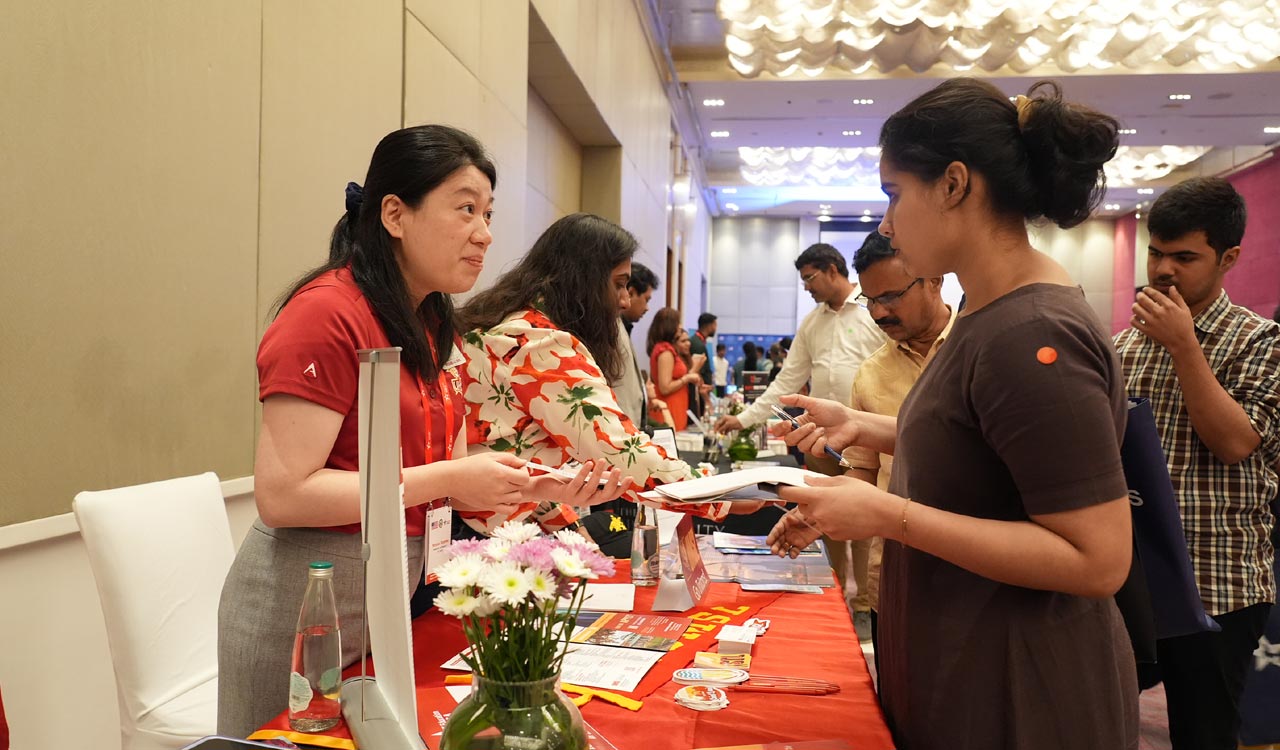Destination US: Powering the Planet — How US universities and EVs are driving climate action
US universities stand as pioneers in electric mobility education. From curriculum design to cutting-edge research, they offer a vibrant ecosystem where technology, sustainability and entrepreneurship converge

Hyderabad: As the world transitions toward a sustainable future, one defining shift is underway: the end of the fossil fuel era. The global race to reach net-zero emissions has ignited innovation in every sector — but nowhere is this more transformative than in the field of transportation.
India’s Push Toward Electric Mobility
Also Read
India’s commitment to electric vehicles (EVs) is not merely symbolic; it’s structural and strategic. The Anusandhan National Research Foundation (ANRF) recently launched the “Mission for Advancement of High-impact Areas on Electric Vehicles” (MAHA-EV), selecting seven research nodes across the country to catalyze innovation in EVs. This initiative directly contributes to the UN’s Sustainable Development Goals, notably:
• Affordable and clean energy
• Clean urban air through reduced vehicular emissions
• Development of EV infrastructure and smart mobility
• Sustainable transportation systems
• Significant reductions in greenhouse gas emissions
With an estimated one billion new vehicles expected to hit global roads by 2050, decarbonizing the transport sector is an existential imperative — and the solution lies in the hands of the emerging generation.
US Universities: Ahead of the Curve
In this global context, US universities stand as pioneers in electric mobility education. From curriculum design to cutting-edge research, they offer a vibrant ecosystem where technology, sustainability, and entrepreneurship converge. Here’s how they are shaping the EV revolution:
Curriculum Trends in Electric Mobility
Many top-tier US universities offer interdisciplinary programs combining mechanical engineering, sustainability science, AI, and entrepreneurship. Notable academic offerings include:
• Masters in Sustainable Transportation or Electric Mobility
• Energy Systems Engineering with EV-specialized electives
Students engage with popular and emerging courses like:
• Electric Vehicle Technology and Design
• Battery Systems and Energy Storage
• Smart Grids and Electric Infrastructure
• Autonomous and Connected Vehicle Systems
• Life Cycle Analysis and Circular Economy
• Entrepreneurship Labs for EV Startups
Frontline Research Areas
US universities don’t just teach — they innovate. Here’s a look at their R&D focus:
• Next-gen Battery Innovation: From solid-state and sodium-ion to biodegradable battery systems
• Smart Charging Infrastructure: Emphasis on vehicle-to-grid (V2G) integration and bi-directional charging
• AI-Driven Systems: Machine learning for route optimization, sensor fusion, and autonomous driving
• Sustainable Manufacturing: Use of recycled carbon fiber and bio-based composites for EV parts
• Urban Integration: Data-driven planning to incorporate EVs into ride-sharing and public transit
Advanced Infrastructure & Ecosystem
The United States boasts some of the most advanced EV research facilities globally:
• EV wind tunnels and real-time simulation labs
• Autonomous driving test tracks
• Prototyping labs with rapid iteration capabilities
• Research hubs integrated into smart city and renewable energy networks
Golden Opportunity for Indian Students
For Indian students passionate about climate action and technology, US universities present a unique springboard. Their analytical skills, technical depth, and resilience make them natural fits for these programs. Here’s how to maximize the opportunity:
1. Choose a Strategic Niche
Specializations like:
Battery materials and chemistry
AI in autonomous navigation
Smart grid communication
Circular EV manufacturing
Charging infrastructure innovation
2. Engage in Research Early
Joining faculty-led research labs as Research Assistants (RA) or Teaching Assistants (TA) from the first semester builds experience and networks. Many labs are funded by NASA, NSF, and DOE and have real-world impact.
3. Leverage Internships and Co-Ops
Internships with leading companies provide practical exposure. Many programs also have built-in co-ops for extended work experience.
4. Hackathons & Global Competitions
Participate in:
DOE’s EcoCAR Challenge
Shell Eco-Marathon
XPRIZE Mobility Challenges
5. Startup & Patent Culture
Universities offer support systems for student entrepreneurs — from legal assistance and seed funding to patent filing. Indian students have successfully commercialized EV technologies ranging from smart chargers to fleet analytics platforms.
6. Network with Purpose
Building connections through:
SAE International
IEEE Power & Energy Society
Women in EV/Autonomous Tech
Conferences like CES, AutoTech Detroit, and EV Tech Expo
Bringing It Back to India
For students aiming to contribute to India’s green future, knowledge transfer is key. Focus on:
• Affordable EV technologies for rural India
• Scalable battery recycling systems
• Locally adaptable charging networks
• Policies and business models aligned with Make-in-India
Startups like Ather, Ola Electric and BluSmart are already working with global institutions and are keen on integrating fresh talent trained abroad.
Conclusion: A Generation in the Driver’s Seat
Electric Vehicles are not just a tool — they are a transformation. Combating climate change requires bold ideas, new-age skills, and the courage to innovate. With the robust infrastructure of US universities and India’s rising ambition, today’s students are uniquely positioned to engineer a better, cleaner world. Whether it’s through batteries that charge in seconds, AI systems that drive with zero error, or startups that electrify last-mile delivery— the future is electric, and the road begins at the university.
EducationUSA is the US Department of State’s official resource for accurate, free, and up-to-date information about studying in the United States. Students can download the EducationUSA India app, available for free on iOS and Android devices, for the latest information about the college application process. Or visit https://educationusa.in/.
In Hyderabad, please visit the one and only EducationUSA center at,
EducationUSA@YAxis Foundation
SL Jubilee, Road No.36, Jubilee Hills,
Hyderabad-500033
Landline: 9000522000
Mobile: 91 9618680143 | 9618761143
Email: HyderabadYAF@educationusa.org
Website: https://educationusa.state.gov
Related News
-
South Central Railway launches Rail Parcel Logistics app
7 hours ago -
CMR Engineering College hosts CSI AI 100K Program
7 hours ago -
Vote for Mouse Deer conservation, urges Hyderabad zoo
7 hours ago -
Telangana: School Education Dept sets 100% Aadhaar target for students
8 hours ago -
Paras Dogra controversy overshadows J&K’s strong showing against Karnataka
8 hours ago -
India face tough Zimbabwe test after South Africa loss in T20 World Cup
8 hours ago -
India beat Australia in shoot-out to end losing streak in FIH Pro League
8 hours ago -
Dev Ruparelia advances with straight-game win at Dutch Junior International
8 hours ago




